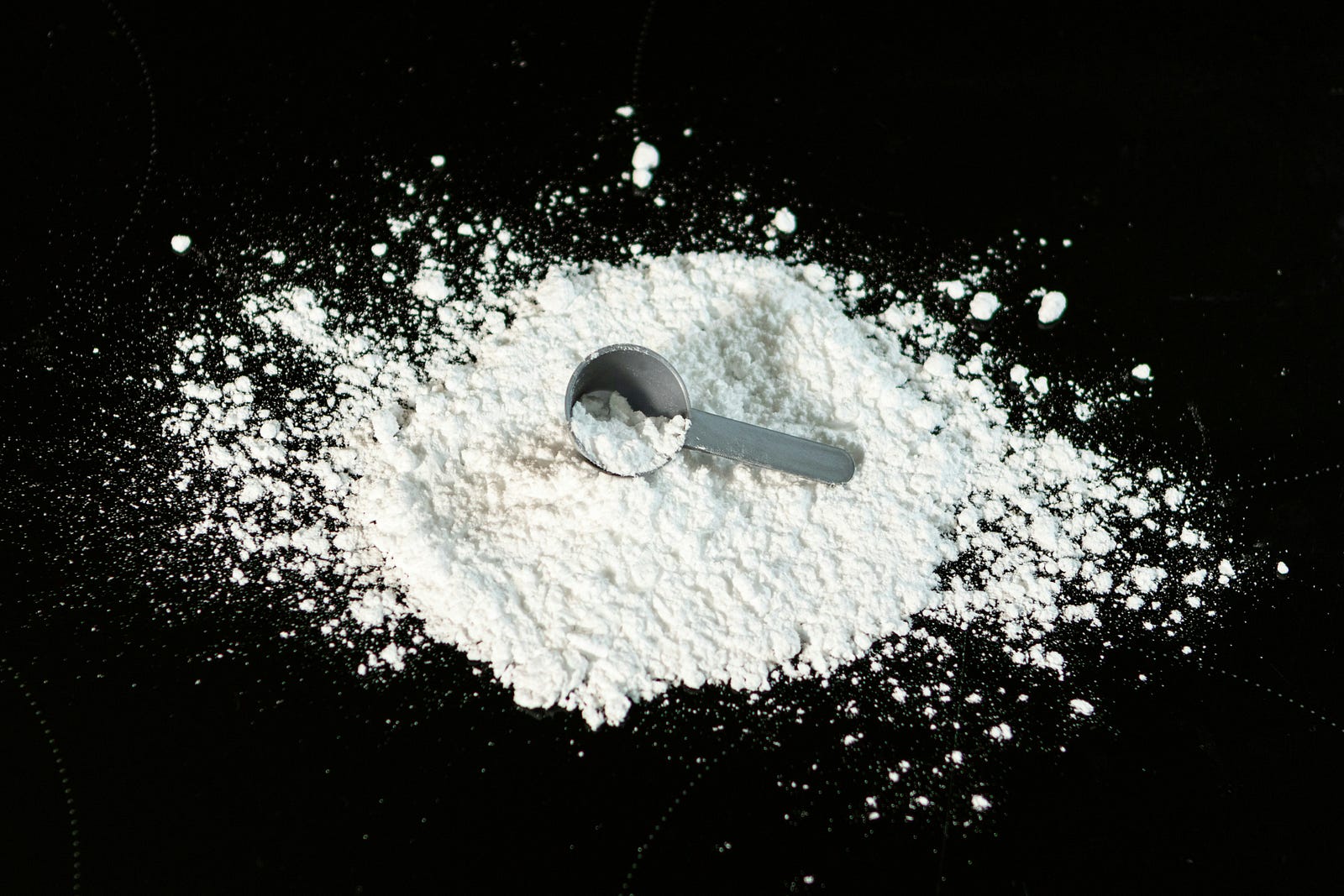WE’VE ALL BEEN THERE—THAT LOOMING DEADLINE, THE NEVER-ENDING TO-DO LIST, AND THE REGRET that precious sleep is a luxury we can’t afford. Today we explore creatine supplementation your brain function.
As Benjamin Franklin famously said, “Early to bed and early to rise makes a man healthy, wealthy, and wise.”
But what about those days (or nights) when defying this wisdom seems the only option?

Key Points
Traditionally known for its muscle-building properties, creatine may be a key to enhancing cognitive performance—even when sleep deprivation disrupts our mental machinery.
This essay dives into the science behind this potential brain boost, exploring how a simple supplement might help us conquer those inevitable sleepless nights and stay sharp when it matters most.
Why I Take Creatine
I have recently been taking creatine while preparing for my bodybuilding physique competition.
Here’s why:
- Muscle Building and Strength. Creatine is most well-known for its ability to support muscle growth and strength gains. It helps my muscles produce more energy during intense workouts, allowing me to lift heavier weights for more repetitions.
- Improved Exercise Performance. Beyond muscle building, creatine can enhance my overall exercise performance, especially for activities requiring short bursts of high intensity, such as weightlifting, sprinting, or interval training. It may also benefit activities with repetitive movements, like cycling or swimming.
- Faster Recovery. Creatine may help my muscles recover faster after exercise by reducing muscle damage and fatigue. The supplement allows me to train harder and more frequently and see quicker results.

Creatine May Enhance Cognition After Short Sleep
New research suggests a surprising potential hero might emerge from the realm of fitness supplements: creatine.
Yes, the same creatine known for building muscle might also boost cognitive performance when sleep is a distant dream.
The study found this:
Just one large dose of creatine supplements improved cognitive task performance in sleep-deprived participants.
In summary, a large single dose of creatine appears to help reverse some of the negative changes in the body’s metabolism and thinking skills caused by sleep deprivation.
Creatine Study Details
To see if creatine truly lived up to its potential brain-boosting claims, the researchers got creative.
They kept the participants awake all night, mimicking the harsh reality of sleep deprivation.
The participants tackled various cognitive tasks throughout the night, like mental puzzles or memory tests.
These were performed at the beginning of the study (before taking anything) and then again at three more points throughout the sleepless night.

Creatine Study Results
Here’s where things get interesting: Three hours after taking creatine (compared to a placebo), the participants showed positive changes in their brain function, as measured by brain metabolism.
Even better, their cognitive performance improved. This mental edge peaked at the four-hour mark and remained noticeable for up to nine hours.
The study specifically found benefits in two key areas: processing capacity, essentially your brain’s ability to juggle multiple tasks, and short-term memory, which lets you hold onto information briefly.
My Take — Creatine’s Potential to Boost Cognition
The findings offer a potential aid for healthcare professionals working long hours. Firefighters and night-shift workers might benefit, too.
Wouldn’t having a non-toxic supplement to help doctors make critical decisions during long shifts be fabulous?

The brain boost from creatine faded after a few hours in this study.
However, the researchers only tested a single, large dose. This practice leaves room for future research exploring whether regular creatine use might provide longer-lasting cognitive benefits.
Creatine Dosing
You might wonder about maximizing your muscle stores if you’re considering creatine supplementation to support your fitness goals.
Here’s the breakdown of two common approaches:
- Slow and Steady: Research shows that consistently taking a moderate dose of creatine (around 3 grams daily) for about a month can fully saturate your muscles. This approach is considered safe and effective in the long run.
- Creatine Loading: This method involves taking a higher dose of creatine for a shorter period (usually a week) followed by a maintenance dose. While it can potentially speed up the process of reaching peak muscle stores, creatine loading isn’t necessary and may not be suitable for everyone.
Creatine Dosing Summary
The takeaway? Both methods can be effective, but the slow and steady approach offers a safe and reliable way to build your creatine stores over time.
It’s important to note that studies on creatine use in women are less common, but some research suggests similar dosing strategies might be beneficial.
Additionally, it’s always a good idea to consult a healthcare professional before starting new supplements.
I could not find many studies on creatine use in people assigned female at birth. However, some research suggests they might benefit from similar dosing strategies.

Creatine — Caution
But not so fast.
Before we all stock up on creatine powder, it’s important to remember that this is just one study.
Moreover, the study lead author, Ali Gordji-Nehad, Ph.D. from the Jülich Research Centre in Germany, offers: “The dose in our study was very high (more than 20 grams). Taking it is not recommended because of the strain on the kidneys.”
More research is needed to confirm these findings and understand the long-term effects of creatine supplementation.
Creatine Supplementation Risks
Although most healthy people can take it with no problem, creatine can have side effects, particularly when you take too much.
Potential side effects include:
- Weight gain
- Anxiety
- Breathing difficulty
- Diarrhea
- Fatigue
- Fever

I could not find much data on long-term side effects.
Finally, just because creatine is natural doesn’t necessarily mean it’s safe.
The U.S. Food and Drug Administration does not hold supplements to the same standards as prescribed medications.
Therefore, you cannot always know exactly what your over-the-counter supplement contains.
Creatine in Natural Foods
While your body produces creatine, some individuals may choose to supplement their intake for various reasons.
This observation is especially true for athletes or those following specific fitness goals.
It’s important to remember that diet plays a role, too — about half of your creatine comes from what you eat.

It’s mostly in foods with lots of protein. Here are some examples:
- Pork
- Beef
- Fish
- Shellfish
- Animal milk, including cow, sheep, and goat
Going Off Creatine: What to Expect
Creatine isn’t a permanent fixture in your body. If you stop taking creatine supplements, your creatine levels will gradually decrease over a few weeks.
This drop can lead to some temporary withdrawal symptoms as your body adjusts to having less creatine available.

Symptoms might include:
- Feeling More Fatigued: Creatine helps fuel your muscles during exercise. Without that extra boost, you might experience more tiredness, especially during workouts.
- Reduced Muscle Size: Creatine can help your muscles appear fuller due to increased water retention. Once you stop taking it, your muscles might appear slightly smaller.
- Slight Weight Loss: When one stops supplementation, the water weight associated with creatine may also contribute to a small weight loss.
It’s important to note that these are temporary adjustments your body makes.
If you experience any significant or concerning side effects, it’s always best to consult with a healthcare professional.
Thank you for reading “Creatine and Your Brain.”




